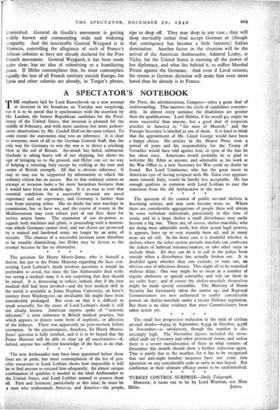The new Ambassador may have been appointed before these lines
are in print, but mere contemplation of the list of pos- sible successors to Lord Lothian shows how impossible it will be to find anyone to succeed him adequately. An almost unique combination of qualities is needed in the ideal Ambassador to the United States, and Lord Lothian seemed to possess them all. First and foremost, particularly at this time, he must be a man who understands America, and America—the people, the Press, the administration, Congress—takes a great deal of understanding. That narrows the circle of candidates consider- ably. In almost every nominee the disabilities are greater than the qualifications. Lord Halifax, if he would go, might be more successful than anyone, but a good deal of suspicion attaches in America to " the men of Munich," and the Foreign Secretary is labelled as one of them. It is hard to think that the appointment of Mt. Lloyd George would have been a happy choice. His articles in the Hearst Press over a period of years and his responsibility for the Treaty of Versailles would have told against him, in spite of the line he has taken since. Americans would probably be as glad to welcome Mr. Eden as anyone, and admirable as his work at the War Office is, a new Secretary for War could no doubt be found. But Lord Cranborne, who has the great merit in American eyes of having resigned with Mr. Eden over appease- ment towards Italy, would be hardly less acceptable. He has enough qualities in common with Lord Lothian to ease the transition from the old Ambassador to the new.


























 Previous page
Previous page